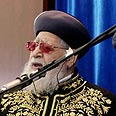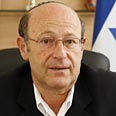
Rabbi Ovadia Yosef: Supports new law
Photo: Gil Yohanan

MK Schneller : Reconciling faith and medical science
Photo: Michal Petel
Following the passage Monday of the bill proposed by MK Otniel Schneller (Kadima), which deems brain death as actual death for all legal and other purposes, MK Moshe Gafni (United Torah Judaism), speaking on behalf of Lithuanian rabbi Yosef Sholom Eliashiv, Tuesday urged all Jewish people to “ask doctors to keep treating a brain-dead relative until he either recovers or his heart stops beating.”
The new law passed in the Knesset allows families to decide, in accordance with their own beliefs and values, whether they deem brain death or cardiac death to be the actual moment of passing. MK Gafni, fiercely objecting to this notion, stated that “this in essence means that someone who has suffered a stroke or aneurysm can in essence be declared dead.”
Saving Lives
Efrat Shapira-Rosenberg
Did you know that Israeli Jews have the lowest rates of organ donation of any ethnic group in the country? In a state that arose from the ashes of the millions who perished, the saving of life at any price could be expected to be the highest item on the national agenda. So why do we recoil from organ donation “for religious reasons”?
A divisive matter
At the heart of this controversy stands a long-running dispute between medical science and Torah law. Whereas medically a person is deemed dead when brain activity ceases, the Torah only views death as having taken place when cardiac activity and respiration no longer take place.
To date only doctors could declare a patient dead. While rabbis were wary of doctors being overly hasty in pronouncing the deaths of their patients, which is tantamount to murder according to halacha, doctors resented "rabbinical supervision" in their hospital rooms.
All organ donations in Israel are carried out strictly with the consent of family members, based on medical evidence offered by the doctors involved. MK Schneller’s new law will allow families to attain their loved one’s medical documentation, and take it to a rabbi if they so wish in order to make sure that the doctor’s point of view in regards to organ donation does not run contrary to halacha.
Schneller consulted with a whole host of rabbis in drafting this new law, in an attempt to bridge the daunting chasm between Jewish law and medical science. While both Rabbi Ovadia Yosef and Chief Sephardic Rabbi Shlomo Amar endorsed the bill, Lithuanian chief rabbi Yosef Sholom Eliashiv objected to it, preferring to adhere to the traditional definition of death as occurring with the cessation of cardiac activity. This limits vastly the range of organs that can remain viable for donation.
MK Gafni, in keeping with Eliashiv's views, objected to this law at every stage of the legislative process. “Death should only be declared with the cessation of cardiac activity,” he said. “From the Torah’s point of view a brain-dead individual is still alive. Today, with all the recent advances in medical science, a person who is brain-dead can be saved by doctors.”
In spite of this dissent, the new law will make it easier for orthodox families to donate their loved ones' organs in face of halachic concerns. It provides for the establishment of a state run medical steering committee that will train doctors in various facets of determining respiratory and brain deaths in their patients, as well as to better balance ethical, halachic and legal concerns arising from organ donation.















